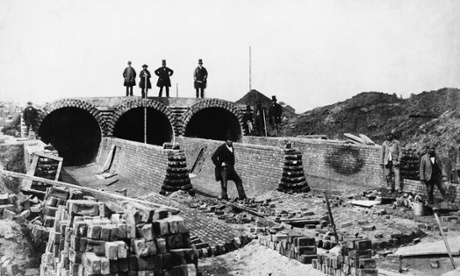Rising sea levels, water security and waste management are among the environmental challenges that Infrastructure Australia has, for the first time, elevated to the top tier of its priorities list.
In its latest list, to be released on Wednesday, Infrastructure Australia said it was elevating environmental concerns because climate change was altering the water cycle and was projected to cause sea level rises of 0.4 to 0.6 metres. It also cited a renewed focus on “resilience” in the face of natural disasters.
A national road maintenance strategy is also newly listed as a high priority, while new priorities include an Indigenous art and cultural facilities program, bolstering mobile telecommunications coverage in regional and remote areas, Sydney-Canberra rail connectivity and an east coast deepwater container port facility.
This year’s list drew on 249 submissions to make recommendations for a $58bn infrastructure pipeline of nationally significant projects, each supported by a business case and worth more than $30m a year to the Australian economy.
It also has a list of desired “initiatives”, or potential infrastructure solutions to unsolved problems, which includes strategies to deal with environmental issues.
Although the list was made and approved in December, Infrastructure Australia’s chief executive, Romilly Madew, said that the focus on resilience would help “build [infrastructure] back better” after the summer’s bushfires and floods.
“We’re acknowledging that these weather events are having an impact on our infrastructure and it’s really important that everyone take that into account,” she said.
Infrastructure Australia listed coastal inundation as a high priority initiative, citing the fact that a flood of up to 1 metre can cause damage of between $60,000 and $80,000 to individual households.
Madew said half of Australia’s coastline was vulnerable to rising sea levels, which could have widespread impacts on telecommunications, road, rail, housing and social infrastructure. She cited recent floods in New South Wales, which hit the northern beaches in Sydney and cut off services such as a childcare centre in Stockton, Newcastle.
The report suggested protecting against coastal inundation using infrastructure such as seawalls and buffer zones, and noted that a policy response should consider “actions to reduce greenhouse gas emissions and planning controls for vulnerable areas”.
Sign up to receive the top stories from Guardian Australia every morning
Infrastructure Australia listed both town and city water security and a national water strategy as high priority initiatives, citing possible “severe urban water shortages or restrictions” and regional towns reliant on a single supply source as causes for concern.
Madew said that water was a nationally significant issue in part because of “compounding factors” such as drought, but Infrastructure Australia wanted a national plan “to keep it on people’s radar” so resilience was improved for the next drought.
Infrastructure Australia also called for a national waste and recycling management strategy to boost Australia’s recycling rate from its current 55% to the target of 70% set out in the 2014-21 waste avoidance and resource recovery strategy.
Regional Australia also emerged as a focus of this edition of the infrastructure priority list, with a call to improve mobile telecommunications coverage in remote areas and improve regional road safety.
“Staying connected requires not only safe and efficient transport options, but also ensuring our towns and regional communities have the same access to telecommunications as the rest of Australia,” Madew said.
“This is to also provide people with reliable access to electronic payment systems, emergency alerts, technology innovations and other critical services.”
Other high priority initiatives that remain on the list from previous years include preservation of a corridor for proposed east coast high speed rail, better connections to improve reliability in the national electricity market, more remote housing and a national electric vehicle fast-charging network.
Infrastructure Australia listed an Indigenous art and cultural facilities program as a priority in the category of “social infrastructure”, noting the high demand for domestic and international cultural tourism and the role of arts and culture in the economic empowerment of Aboriginal and Torres Strait Islander peoples.
Other newly listed priority initiatives were:
In NSW: the John Hunter health and innovation precinct; Great Western highway improvements between Katoomba and Lithgow; Princes Highway upgrade from Nowra to the Victorian border; and South Creek integrated land use and water cycle management
In Victoria: Cycling access to Melbourne CBD; and Frankston public transport connectivity
In Queensland: national land transport network maintenance, a high priority; and the inland road network upgrade
In Western Australia: regional and rural road network improvements and Perth water security, both high priorities; Great Northern Highway improvements from Broome to Kununurra; Wheatbelt secondary freight network improvements; South Coast Highway improvements from Albany to Esperance; South West Interconnected Systems transformation; a liquefied natural gas research facility; and Port Hedland port capacity.
Madew said it became “really clear in the bushfires that the Princes Highway’s connectivity is crucially important” and it had been “constrained” as residents sought to evacuate the NSW south coast.
The same would apply to the proposed upgrade of the Great Western highway, she said, which was crucially important for evacuations but had been blocked on and off for weeks due to fires.
Madew has been appointed to the expert advisory panel for the Csiro’s review on climate and disaster resilience, lead by the chief scientist, Alan Finkel.











